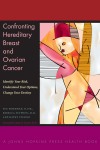Guest post by Sue Friedman, DVM
Recommendations in preventive care and screenings have long been based on average risks for the general population. Heart disease, for example, is on average a later-onset disease, so most children and young adults are not screened for it. The same is true for cancer.
One look around any crowded room tells us that we are not all the same. Many factors, including our genetic makeup, help determine how we look, how we behave, and even when and what diseases we are likely and unlikely to develop.
Scientists know from studying thousands of people that most women who are diagnosed with breast or ovarian cancer will be postmenopausal. Averages aside, many of us know of people who were diagnosed with heart disease or cancer much earlier in life, too often with devastating outcomes. When breast cancer strikes at a young age, it is often more aggressive and already advanced before it is detected. Yet many of us also know people who lived their entire life to old age without developing either cancer or heart disease. In the past, recommendations for health screenings such as mammography and colonoscopy were the same for everyone, based on observations of the general population.
One look around any crowded room tells us that we are not all the same. Many factors, including our genetic makeup, help determine how we look, how we behave, and even when and what diseases we are likely and unlikely to develop. What makes us individuals is due in part to our genes. Other than identical twins, no two people have the same genetic makeup; we are unique. How then can science take into account and reconcile information about average risk for disease and, at the same time, factor in our individual makeup to assure the best health outcome for all people? This is the realm of personalized medicine.
As science and medicine advance, we are seeing more personalized medicine incorporated into health care. We are entering an age where genetic tests can help us learn more about our individual risk for disease and age of onset, and provide better options for detecting, treating more effectively, and even preventing disease. Research has advanced to a point where understanding risk and intervening has been shown to save lives. Expert panels are now developing screening and prevention recommendations that take into account family history of disease and even a person’s genetic test results.
What if you knew that you were very likely to get breast cancer in your lifetime? The average woman’s lifetime risk of breast cancer is about 12.5%, and most of that risk occurs after age 50. What if your risk was more like 60% and the cancer was more likely to occur when you were younger? Would you make different decisions about breast screening? What if you learned your risk for ovarian cancer was as high as 50% and that removing your ovaries after you were done having children could lower that risk drastically and improve your chances of living to old age? If you knew that being active and fit could influence your risk for cancer later in life, would you be more likely to exercise? How might you use knowledge about your risk for cancer to improve how you live today?
Risk is complicated, and it isn’t yet an exact science. Although genetic tests are available to help determine your risk for disease, there is more to disease prediction and prevention than just a single test. Genetics experts are the specialists who understand and know the latest about genetic tests and research and how to apply the complex information to personalize your care.
Fortunately, you don’t have to navigate this risk alone. Facing Our Risk of Cancer Empowered (FORCE), the national nonprofit organization devoted to people facing hereditary cancer risk, has information, tools, and resources to help people understand their risk for cancer and make the best health care decisions. The new book that I co-authored with Rebecca Sutphen, M.D., and Kathy Steligo, Confronting Hereditary Breast and Ovarian Cancer: Identify Your Risk, Understand Your Options, Change Your Destiny, provides this information in a concise, understandable, and easily accessible format. With the right guidance, knowing your risk for cancer and the options available to manage that risk can be lifesaving information. For those with cancer, learning if the cancer was hereditary can affect treatment choices and your chances of never being diagnosed again.
Sue Friedman, DVM, is the founder and executive director of Facing Our Risk of Cancer Empowered (FORCE). Her numerous articles on hereditary cancer have appeared in Oncology Times, CURE, Gene Watch, and the Boston Globe, among others. Together with Rebecca Sutphen, M.D. and Kathy Steligo, she wrote Confronting Hereditary Breast and Ovarian Cancer: Identify Your Risk, Understand Your Options, Change Your Destiny, which will be available January 20 from the JHU Press.

